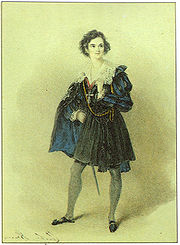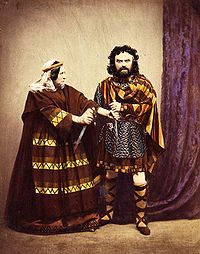
Charles Kean
Encyclopedia

County Waterford
*Abbeyside, Affane, Aglish, Annestown, An Rinn, Ardmore*Ballinacourty, Ballinameela, Ballinamult, Ballinroad, Ballybeg, Ballybricken, Ballyduff Lower, Ballyduff Upper, Ballydurn, Ballygunner, Ballylaneen, Ballymacarbry, Ballymacart, Ballynaneashagh, Ballysaggart, Ballytruckle, Bilberry, Bunmahon,...
, the son of the actor
Actor
An actor is a person who acts in a dramatic production and who works in film, television, theatre, or radio in that capacity...
Edmund Kean
Edmund Kean
Edmund Kean was an English actor, regarded in his time as the greatest ever.-Early life:Kean was born in London. His father was probably Edmund Kean, an architect’s clerk, and his mother was an actress, Anne Carey, daughter of the 18th century composer and playwright Henry Carey...
.
After preparatory education at Worplesdon and at Greenford, near Harrow
Harrow, London
Harrow is an area in the London Borough of Harrow, northwest London, United Kingdom. It is a suburban area and is situated 12.2 miles northwest of Charing Cross...
, he was sent to Eton College
Eton College
Eton College, often referred to simply as Eton, is a British independent school for boys aged 13 to 18. It was founded in 1440 by King Henry VI as "The King's College of Our Lady of Eton besides Wyndsor"....
, where he remained three years. In 1827, he was offered a cadetship in the East India Company
British East India Company
The East India Company was an early English joint-stock company that was formed initially for pursuing trade with the East Indies, but that ended up trading mainly with the Indian subcontinent and China...
's service, which he was prepared to accept if his father would settle an income of £400 on his mother. The elder Kean refused to do this, and his son determined to become an actor. He made his first appearance at Drury Lane
Drury Lane
Drury Lane is a street on the eastern boundary of the Covent Garden area of London, running between Aldwych and High Holborn. The northern part is in the borough of Camden and the southern part in the City of Westminster....
on 1 October 1827 as Norval in Home
John Home
John Home was a Scottish poet and dramatist.-Biography:He was born at Leith, near Edinburgh, where his father, Alexander Home, a distant relation of the earls of Home, was town clerk. John was educated at the Leith Grammar School, and at the University of Edinburgh, where he graduated MA, in 1742...
's Douglas, but his continued failure to achieve popularity led him to leave London in the spring of 1828 for the provinces. At Glasgow
Glasgow
Glasgow is the largest city in Scotland and third most populous in the United Kingdom. The city is situated on the River Clyde in the country's west central lowlands...
, on 1 October in that year, father and son acted together in Arnold Payne's Brutus, the elder Kean in the title-part and his son as Titus.

United States
The United States of America is a federal constitutional republic comprising fifty states and a federal district...
in 1830, where he was received with much favour, he appeared in 1833 at Covent Garden
Covent Garden
Covent Garden is a district in London on the eastern fringes of the West End, between St. Martin's Lane and Drury Lane. It is associated with the former fruit and vegetable market in the central square, now a popular shopping and tourist site, and the Royal Opera House, which is also known as...
as "Sir Edmund Mortimer" in Colman
George Colman the Younger
George Colman , known as "the Younger", English dramatist and miscellaneous writer, was the son of George Colman "the Elder".-Life:...
's The Iron Chest, but his success was not pronounced enough to encourage him to remain in London, especially as he had already won a high position in the provinces. In January 1838, however, he returned to Drury Lane, and played Hamlet
Hamlet
The Tragical History of Hamlet, Prince of Denmark, or more simply Hamlet, is a tragedy by William Shakespeare, believed to have been written between 1599 and 1601...
with a success which gave him a place among the principal tragedians of his time. He was married to the actress Ellen Tree (1805-1880) on 25 January 1842, and paid a second visit to America with her from 1845 to 1847.
Returning to England, he entered on a successful engagement at the Haymarket, and in 1850, with Robert Keeley
Robert Keeley (comedian)
Robert Keeley was an actor-manager, comedian and female impersonator of the nineteenth century. In 1823 he originated the role of 'Fritz' in Presumption; or, the Fate of Frankenstein, a stage adaptation of Mary Shelley's novel Frankenstein.-Early life:Robert Keeley was born in London as one of...
, became lessee of the Princess's Theatre, London
Princess's Theatre, London
The Princess's Theatre or Princess Theatre was a theatre in Oxford Street, London. The building opened in 1828 as the "Queen's Bazaar" and housed a diorama by Clarkson Stanfield and David Roberts. It was converted into a theatre and opened in 1836 as the Princess's Theatre, named for then Princess...
. The most noteworthy feature of his management was a series of gorgeous Shakespearean
William Shakespeare
William Shakespeare was an English poet and playwright, widely regarded as the greatest writer in the English language and the world's pre-eminent dramatist. He is often called England's national poet and the "Bard of Avon"...
revivals that aimed for "authenticity". Kean also mentored the young Ellen Terry
Ellen Terry
Dame Ellen Terry, GBE was an English stage actress who became the leading Shakespearean actress in Britain. Among the members of her famous family is her great nephew, John Gielgud....
in juvenile roles. Charles Kean was not a great tragic actor. He did all that could be done by the persevering cultivation of his powers, and in many ways manifested the possession of high intelligence and refined taste, but his defects of person and voice made it impossible for him to give a representation at all adequate of the varying and subtle emotions of pure tragedy. But in melodramatic parts such as the king in Dion Boucicault
Dion Boucicault
Dionysius Lardner Boursiquot , commonly known as Dion Boucicault, was an Irish actor and playwright famed for his melodramas. By the later part of the 19th century, Boucicault had become known on both sides of the Atlantic as one of the most successful actor-playwright-managers then in the...
's adaptation of Casimir Delavigne
Casimir Delavigne
Jean-François Casimir Delavigne was a French poet and dramatist.-Biography:Delavigne was born at Le Havre, but was sent to Paris to be educated at the Lycée Napoleon. He read extensively...
's Louis XI, and Louis and Fabian dei Franchi in Boucicault's adaptation of Dumas
Alexandre Dumas, père
Alexandre Dumas, , born Dumas Davy de la Pailleterie was a French writer, best known for his historical novels of high adventure which have made him one of the most widely read French authors in the world...
's The Corsican Brothers, his success was complete. From his "tour round the world" Kean returned in 1866 in broken health, and died in London on 22 January 1868 at the age of 57. He is buried at Horndean, Hampshire.

